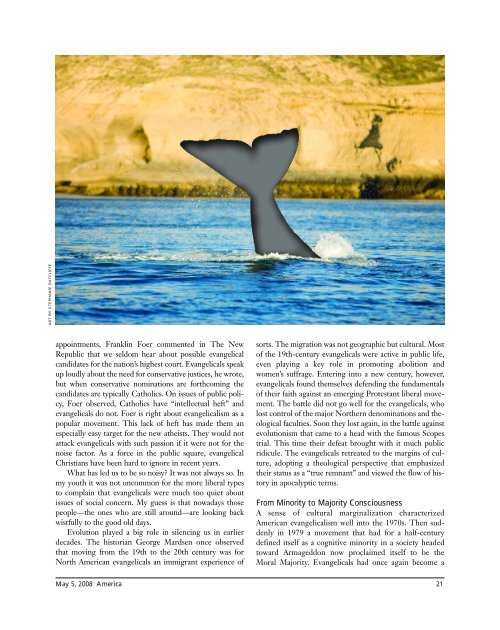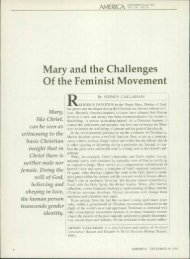ART BY STEPHANIE RATCLIFFEappointments, Franklin Foer commented in The NewRepublic that we seldom hear about possible evangelicalcandidates for the nation’s highest court. Evangelicals speakup loudly about the need for conservative justices, he wrote,but when conservative nominations are forthcoming thecandidates are typically Catholics. On issues of public policy,Foer observed, Catholics have “intellectual heft” andevangelicals do not. Foer is right about evangelicalism as apopular movement. This lack of heft has made them anespecially easy target for the new atheists. They would notattack evangelicals with such passion if it were not for thenoise factor. As a force in the public square, evangelicalChristians have been hard to ignore in recent years.What has led us to be so noisy? It was not always so. Inmy youth it was not uncommon for the more liberal typesto complain that evangelicals were much too quiet aboutissues of social concern. My guess is that nowadays thosepeople—the ones who are still around—are looking backwistfully to the good old days.Evolution played a big role in silencing us in earlierdecades. The historian George Mardsen once observedthat moving from the 19th to the 20th century was forNorth <strong>America</strong>n evangelicals an immigrant experience ofsorts. The migration was not geographic but cultural. Mostof the 19th-century evangelicals were active in public life,even playing a key role in promoting abolition andwomen’s suffrage. Entering into a new century, however,evangelicals found themselves defending the fundamentalsof their faith against an emerging Protestant liberal movement.The battle did not go well for the evangelicals, wholost control of the major Northern denominations and theologicalfaculties. Soon they lost again, in the battle againstevolutionism that came to a head with the famous Scopestrial. This time their defeat brought with it much publicridicule. The evangelicals retreated to the margins of culture,adopting a theological perspective that emphasizedtheir status as a “true remnant” and viewed the flow of historyin apocalyptic terms.From Minority to Majority ConsciousnessA sense of cultural marginalization characterized<strong>America</strong>n evangelicalism well into the 1970s. Then suddenlyin 1979 a movement that had for a half-centurydefined itself as a cognitive minority in a society headedtoward Armageddon now proclaimed itself to be theMoral Majority. Evangelicals had once again become aMay 5, 2008 <strong>America</strong> 21
noisy presence in the public square.The shift from minority to majority status took placewithout much theological reflection. Not long after JerryFalwell appeared on the public scene, for example, he confessedthat he had once preached a sermon denouncingMartin Luther King Jr., on the grounds that preachersought not to be involved in politics. Now he was ready toadmit that King had been right. Unfortunately, Falwellnever offered much of an explanation as to the theologicalbasis for his change of heart. Had he now embraced a differentunderstanding of “Bible prophecy” from the dispensationalismthat had shaped his previous ministry? Did hehave a new doctrine of the church? What was his theologicalgrasp now of the common good, public justice and therelationship between church and state? Answers to thesequestions were not forthcoming.My own take is that for the past two centuries evangelicalshave gone back and forth between two eschatologicalperspectives. Typically we have done so without much theologicalawareness. Thus, in the late 1970s, when theprospects for cultural influence suddenly looked good, theevangelicals switched back to a more hopeful eschatology.Once again <strong>America</strong> was a chosen nation that could serveGod’s revealed purposes, if only the faithful would restorethe nation to its founding vision.If this new activism was not generated by a new theologicaldiscovery, what did account for the enthusiasm forpublic policy issues? One factor was a shift in class. By the1980s, many evangelical Pentecostal and holiness congregations,which had once resided on the wrong side of thetracks, had become flourishing megachurches sitting on thebest real estate in town. This turnabout nurtured a sense ofcultural leverage.What motivated evangelicals to use their leverageaggressively to bring about change was a concern about therearing of children. In large part the religious right hasarisen as a response to the sexual revolution that wassparked in the 1960s. The increasing visibility of pornography,the gay rights movement, the promiscuity that camewith the availability of the pill—all of these made evangelicalparents very nervous about the introduction of sex educationin the public schools. Many early initiatives by thereligious right were directed against school boards.That was also the case with creation science, a crusadethat had much to do with parental concern about schools.While the “young earth” adherents have presented theirviews as an alternative science, there has not been muchcareful, give-and-take dialogue about the nature of scientificinquiry and the relationship between the Bible and science.Much of the rhetoric has been fueled by conspiracytheories, relying heavily on sloganeering and the use of biblicalmaterials as proof-texts.A New Openness Among EvangelicalsThe irony is that while grass-roots evangelicals have beenembarrassing themselves in public life, many of their sonsand daughters have gained a significant voice in the<strong>America</strong>n academy. The cover story of The Atlantic forOctober 2000 boldly announced, “The Opening of theEvangelical Mind.” Alan Wolfe, who wrote the story, notonly chronicled the scholarly contributions of evangelicalschools like Calvin College, Wheaton College and FullerSeminary, but he also pointed out that the history and theologydepartments at the University of Notre Dame havebecome a home for many evangelical professors and graduatestudents. Just recently Mark Noll left Wheaton toassume the professorship at Notre Dame previously held byGeorge Mardsen, who had moved to Notre Dame fromCalvin College after making his mark in <strong>America</strong>n religioushistory there. Harvard Divinity School has established anendowed chair in evangelical thought. And evangelicalscholars have been instrumental in forming an array offaith-based associations in several disciplines, like literature,history, philosophy and the natural and social sciences.The problem is not that evangelical Christianity lacksthe intellectual resources to remedy the much-publicizeddefects of popular evangelicalism. Rather, the challenge is tofind some way of repairing the disconnection betweengrass-roots evangelicals and evangelical academics who havebeen making their marks in the scholarly disciplines.Surely there is much to criticize in the freewheelingattacks on the faith that have been launched by the newatheists, and evangelical scholars have a contribution tomake to those debates. It is also an opportune time for evangelicalsto speak clearly to our own community of faith.Popular evangelicalism is at a vulnerable point: many of ourformer heroes have embarrassed us. There may be morereceptivity now to new thoughts about what it means towork for the common good.We academics will need pastoral support in making sucha case to our own people. We can take encouragement fromthe fact that some wise evangelical pastors have emerged aspublic leaders during the past decade. Bill Hybels, JoelHunter and Rick Warren, for example, have not only takenon different issues (AIDS, global warming, economic justice)than the religious right traditionally did, but have doneso with a sense of kinship with the evangelical scholarlycommunity and a spirit of civility toward those whom thereligious right often identified as enemies of the faith.This may be the right time for evangelicals to reflecton how people whom we have identified as our enemiesmay actually be speaking some truths to us. Perhaps in themysterious ways of providence the new atheists have beenraised up as unwitting servants of the Lord for such a timeas this.A22 <strong>America</strong> May 5, 2008









